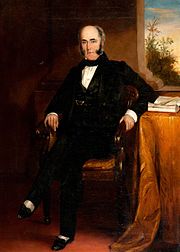| Alan Cameron of Erracht | |
|---|---|
 Alan Cameron of Erracht | |
| Born | 1753 |
| Died | 9 March 1828 |
| Allegiance |
|
| Service/branch |
|
| Rank | Lieutenant-General |
| Battles/wars |
American Revolutionary War Flanders Campaign Peninsular War |
Lieutenant-General Sir Alan Cameron of Erracht (1753 – 9 March 1828) was a British soldier who, at his own expense in 1793, raised the 79th Regiment of Foot (Cameronian Volunteers).
Military career[]
Born in Erracht, near Banavie in Lochaber[1] Cameron joined the army as a volunteer and served in North America. At the beginning of the American Revolutionary War Cameron was captured by American colonists in 1775 and imprisoned for two years in Philadelphia in Pennsylvania. He returned to Scotland in 1784.[2]
After war was declared with revolutionary France in 1793 Cameron raised the 79th Regiment of Foot (Cameronian Volunteers) and was accepted as its Colonel (although his army rank still appears to be no more than Major at this point[3]). He commanded the regiment when it joined the forces of the Duke of York in the Flanders Campaign 1794, and during the retreat through Holland 1795. From 1795-1797 the regiment was in the West Indies and served at Martinique. Cameron was promoted Lieutenant-Colonel in 1796. Devastated by fever the 79th was eventually withdrawn from the West Indies and rebuilt in Guernsey 1798. Cameron again served under York in the Anglo-Russian invasion of Holland in 1799. The 79th was in garrison in Houat in 1800, then joined Abercromby's expedition to Egypt and Minorca in 1801. A 2nd battalion was raised in 1804. Cameron was confirmed as Colonel 79th Foot on 1 January 1805. In 1807 he led his regiment in the expedition against Copenhagen under Cathcart.[2]
Cameron joined the army in the Peninsular in late 1808, as a Brigadier-General commanding the 2nd Brigade of Rowland Hill’s 3rd Division in Portugal, collecting stragglers from Moore’s army. Under Wellesley from 1809, his brigade saw action at Oporto 12 May, then became the 2nd Brigade of Sherbrooke’s 1st Division, fighting at Talavera 28 July, and at Busaco 27 September 1810. He was promoted Major-General on 25 July 1810 and invalided home.[2]
Cameron was noted for his outspoken eccentricity. When asked his opinion on the idea of replacing kilts with ‘trews’ in the Highland regiments he responded famously and at length against it.[4] When the 95th Rifles were added to make up his brigade in late 1808 "On hearing that our four companies were to be put under his command, this gallant but eccentric old chieftain declared, ‘he did not want a parcel of riflemen, as he already had a thousand Highlanders, who would face the devil.’ Had our corps been raised northward of the Tweed, it is more probable that our brigadier would have set a higher value on us; but we were moved to another brigade before he had an opportunity of judging of the merits or demerits of the Southerners in the field"[5]
Cameron became a Knight of the Bath in 1815 and lieutenant-general in 1819.[2]
References[]
- ↑ "Alan Cameron of Erracht". Oxford Dictionary of National Biography. http://www.oxforddnb.com/view/article/4432. Retrieved 26 February 2017.
- ↑ 2.0 2.1 2.2 2.3
"Cameron, Alan". Dictionary of National Biography. London: Smith, Elder & Co. 1885–1900.
- ↑ Army Lists
- ↑ Osprey Wellington’s Highlanders p.14-15
- ↑ Leach Rough Sketches of the Life of an Old Soldier p.57-58 - note he is not mentioned by name, but it seems most likely it was Cameron.
The original article can be found at Alan Cameron of Erracht and the edit history here.